Review of 24 APEC Summits
(Baonghean.vn) - On the occasion of the 25th APEC Summit taking place from November 6-11 in Da Nang, let's review previous APEC Summits.
1. The first APEC Summit in Seattle (USA), November 1993
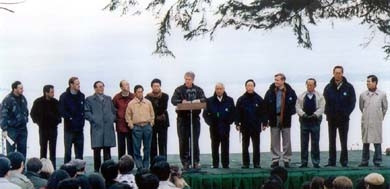 |
| The joint statement affirmed the emergence of APEC as a new voice for the Asia-Pacific region in international affairs. The meeting marked a new development step for APEC and this activity has become an annual practice of the leaders of member economies. |
2- The 2nd APEC Summit in Bogor (Indonesia), November 1994
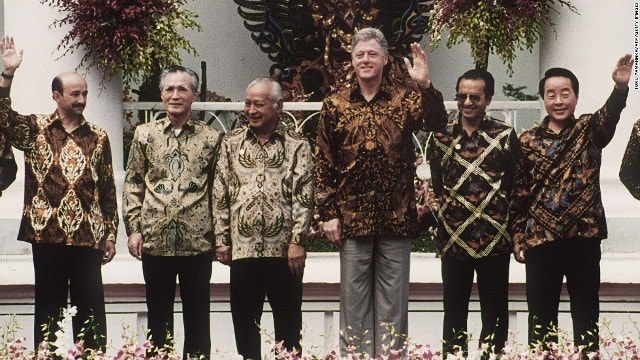 |
| At this conference, a specific time was set for completing the goal of free trade and investment for developed industrial countries by 2010 and for developing economies by 2020. |
3. The 3rd APEC Summit in Osaka (Japan)
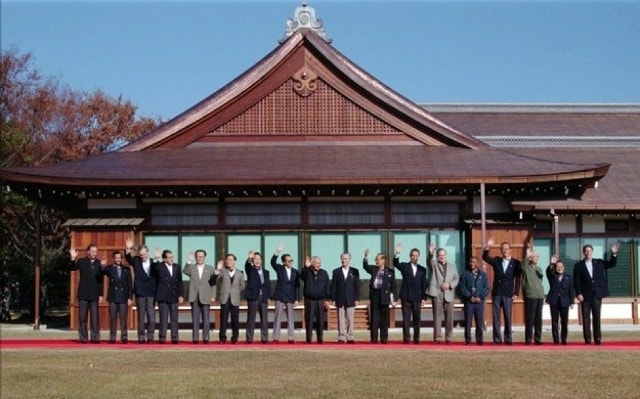 |
| The conference marked a more concrete step forward for APEC, through the "Osaka Action Program", which includes two major contents: Liberalization, promotion of trade and investment; economic and technical cooperation. APEC has set out the basic principles for liberalizing trade and investment in 15 specific areas among member economies. |
4- The 4th APEC Summit in Manila (Philippines), November 1996
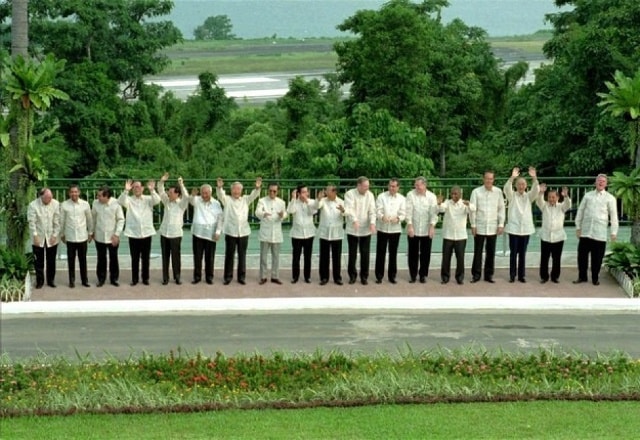 |
| The conference set out six specific priorities in APEC's cooperation activities, including: Human resource development; Developing a stable and effective capital market; Strengthening economic infrastructure, especially telecommunications; Developing transportation and energy; Using technologies for the future; and Ensuring quality of life through environmental protection programs, developing and strengthening small and medium enterprises. |
5- The 5th APEC Summit in Vancouver (Canada), October 1997
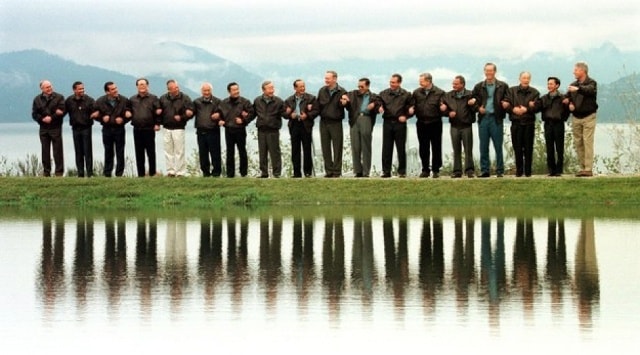 |
| The conference issued a document called “Vision for the 21st Century”, affirming the current and future links between members and committing to cooperation in three pillars: liberalization, facilitation and economic and technical cooperation. The conference also accelerated the identification of areas to be liberalized two years earlier than the Bogor Conference target. |
6- The 6th APEC Summit in Kuala Lumpur (Malaysia), November 1998
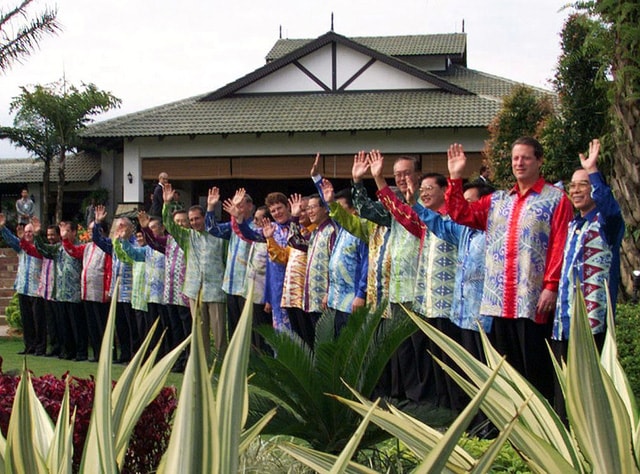 |
| adopted the Declaration "Strengthening the Foundations for Growth" affirming the determination to build a prosperous Asia-Pacific community, ensuring equitable economic development of member economies. The conference admitted 3 new members: Vietnam, Russia and Peru, bringing the total number of members to 21; at the same time, decided to suspend the consideration period for admitting new members for 10 years. |
7- The 7th APEC Summit in Auckland (New Zealand), November 1999
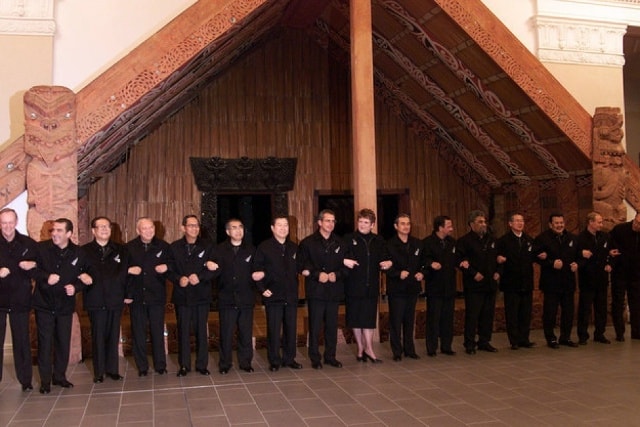 |
| The Conference adopted a Joint Statement identifying the enhancement of economic and technical cooperation as a fundamental factor to improve people's living standards towards prosperity, narrowing the development gap between Asia-Pacific economies; the financial crisis has further demonstrated the importance of cooperation in building management capacity, exchanging science and technology, and developing infrastructure. |
8- The 8th APEC Summit in Bandar Seri Begawan (Brunei), November 2000
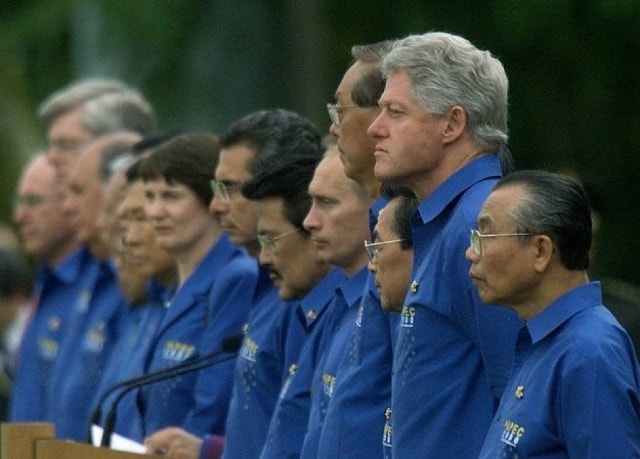 |
| The Conference issued a Joint Statement expressing the aspirations of the majority of economic leaders in building new economic and trade rules, establishing a more favorable environment for development, and at the same time having an important voice in determining that new rules of the World Trade Organization (WTO) must meet the interests of developing countries. |
9- The 9th APEC Summit in Shanghai (China), November 2001
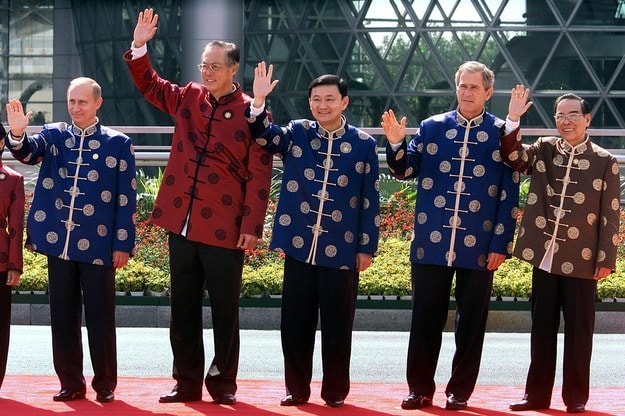 |
| The 9th APEC Summit in Shanghai (China), November 2001, adopted the Joint Statement and the Shanghai Declaration. |
10- 10th APEC Summit in Los Cabos (Mexico), October 2002
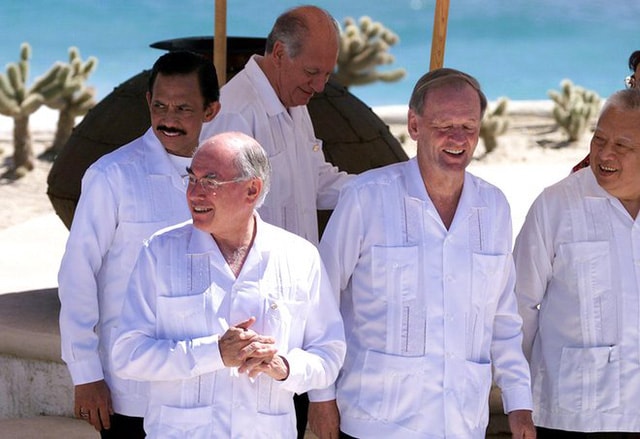 |
| The conference adopted a US-proposed common security plan called the "APEC Secure Trade Initiative" (STAR), aimed at promoting security and increasing trade within the bloc. |
11- 11th APEC Summit in Bangkok (Thailand), October 2003
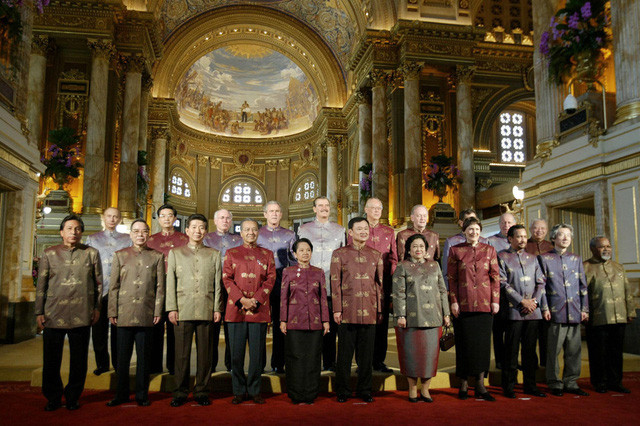 |
| The conference issued the Bangkok Declaration on “Partnership for the Future”. Accordingly, APEC leaders agreed to promote partnerships to move towards trade and investment liberalization and facilitation, while protecting people and communities from security threats and helping people fully benefit from the process of trade liberalization and openness. |
12- The 12th APEC Summit in Santiago de Chile (Chile), November 2004
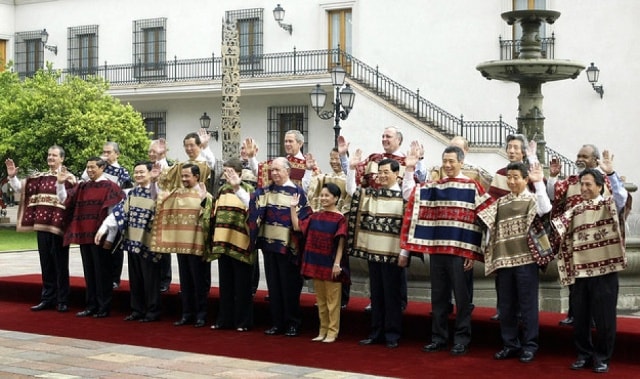 |
| Adopted a Joint Statement, which addressed a number of specific issues such as counter-terrorism, trade, health, oil prices and anti-corruption. |
13- The 13th APEC Summit in Busan (Korea), November 2005
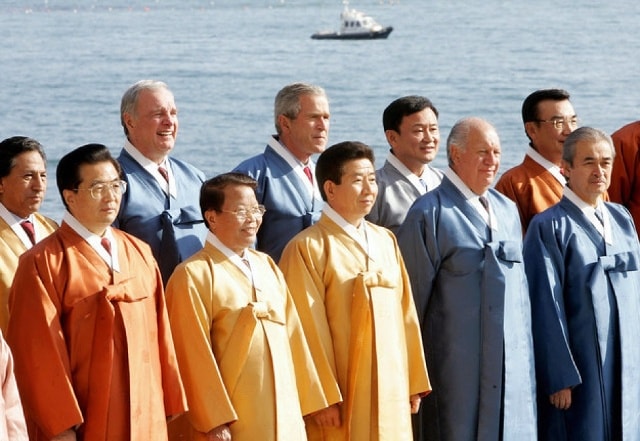 |
| The conference adopted the Busan Declaration (7 points), including a separate Declaration on the WTO Doha Round; adopted the Busan roadmap towards achieving the Bogor goals; affirmed commitments in the areas of counter-terrorism; ensuring regional trade security, health security, dealing with natural disasters and emergencies, energy security and issues such as anti-corruption, dialogue with the business community, and APEC reform. |
14- 14th APEC Summit in Hanoi (Vietnam), November 2006
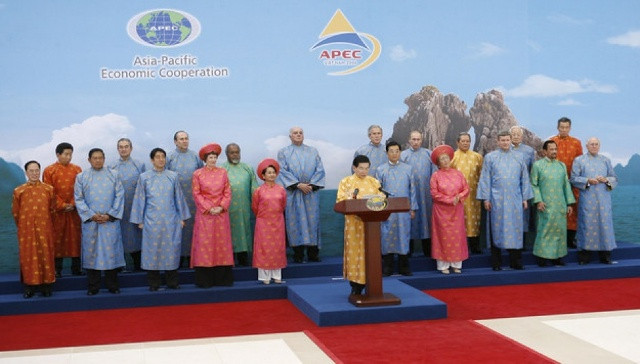 |
| The Conference adopted the “Hanoi Declaration” and issued a separate Statement on the Doha Round, which affirmed strong political determination and emphasized a number of practical measures to soon restart the Round; approved the Hanoi Action Plan to implement the Busan Roadmap, aiming at the Bogor Goals; and adopted APEC reform recommendations with many specific measures to make APEC increasingly more vibrant, dynamic and effective. |
15- 15th APEC Summit in Sydney (Australia), September 2007
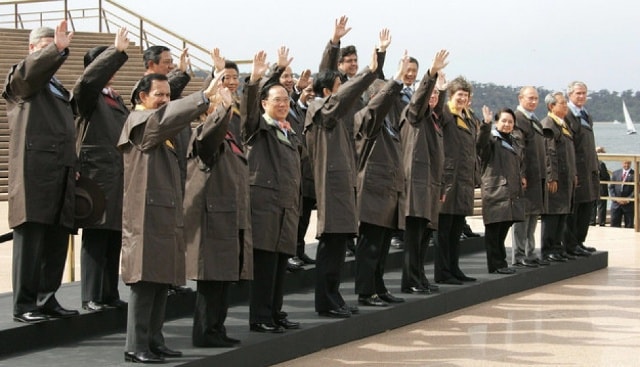 |
| The conference adopted a Declaration addressing five specific issues that could have a direct impact on APEC's goals, including climate change; energy security and clean development; the paramount importance of the Multilateral Trading System, regional economic integration; enhancing human security and strengthening APEC. |
16- 16th APEC Summit in Lima (Peru), November 2008
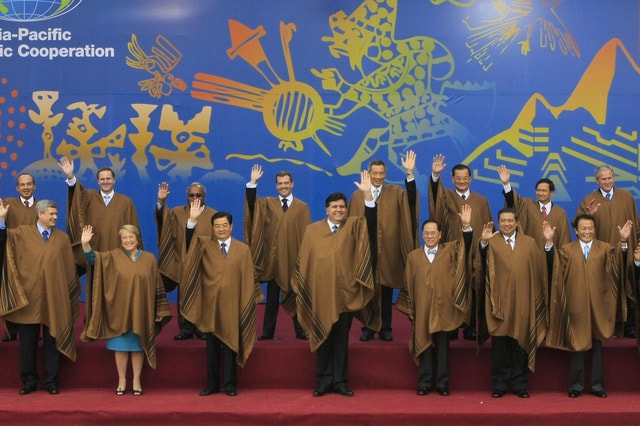 |
| The conference issued the Lima Declaration and the Statement "A New Commitment to the Development of the Asia-Pacific Region", demonstrating the strong determination of APEC leaders in promoting economic cooperation, financial reform, trade and investment facilitation, and building a safe and increasingly sustainable Asia-Pacific region. |
17- 17th APEC Summit in Singapore, November 2009
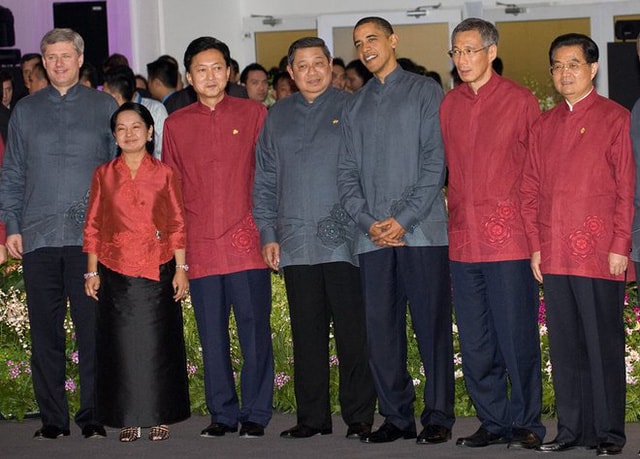 |
| The conference adopted two Declarations on “Sustaining Regional Growth and Connectivity” and “New Growth Model for a Connected Asia-Pacific Region in the 21st Century”, demonstrating strong determination to maintain growth and prepare for economic recovery. |
18- The 18th APEC Summit in Yokohama (Japan), November 2010
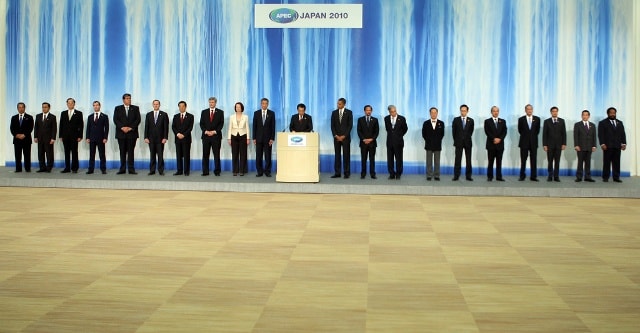 |
| The conference adopted the “Yokohama Vision – Bogor Goals and the Future” Statement, along with three accompanying documents on the “Statement on the Assessment of the Implementation of the Bogor Goals”, “APEC Growth Strategy” and “Measures towards the Free Trade Area of the Asia-Pacific”. The conference achieved very meaningful results, opening a new path for APEC cooperation in the coming years. |
19- The 19th APEC Summit in Hawaii (USA), November 2011
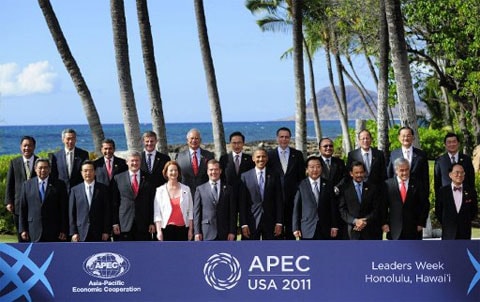 |
| The conference adopted the "Honolulu Declaration - Towards a Cohesive Regional Economy" and four accompanying documents on promoting effective, non-discriminatory and market-oriented innovation policies; enhancing the participation of small and medium-sized enterprises in global production chains; trade and investment in environmental goods and services; and promoting the implementation of good governance practices. |
20- The 20th APEC Summit in Vladivostok (Russia), September 2012
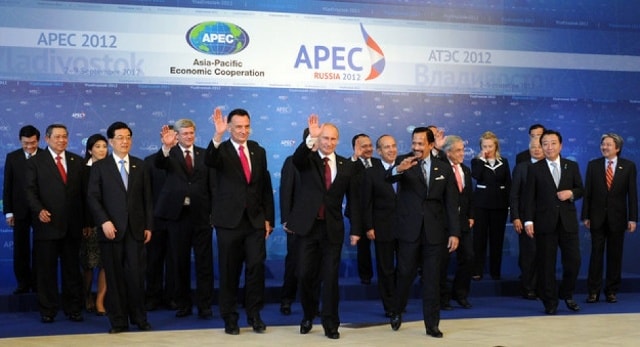 |
| The conference is of special significance, marking 20 years since APEC leaders first met in the US. The conference adopted the Joint Statement “Connecting for Growth, Innovating for Prosperity” and five accompanying documents on innovative growth, energy security, trade liberalization of environmental goods, educational cooperation, anti-corruption and transparency. |
21- 21st APEC Summit in Bali (Indonesia), October 2013
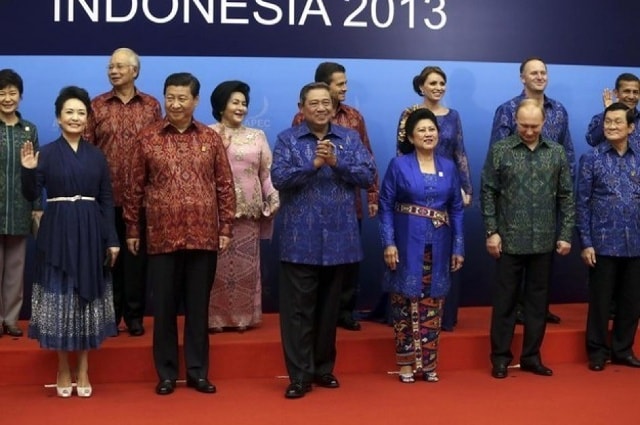 |
| The conference adopted the “Declaration on supporting the multilateral trading system and the 9th Ministerial Conference of the World Trade Organization”; the first new comprehensive and long-term orientations are the “APEC Connectivity Framework” on infrastructure, institutions and people and the “Long-term Plan on APEC Infrastructure-Investment Development” for the period 2013-2016, in which the most notable is the establishment of the APEC Trade-Investment Liberalization Fund on Supply Chain Connectivity and the adoption of the APEC target of annual exchange of 1 million students by 2020; “APEC Initiative on Cooperation on Ocean-Related Issues” and “APEC Food Security Roadmap to 2020”… |
22- 22nd APEC Summit in Beijing (China), November 2014
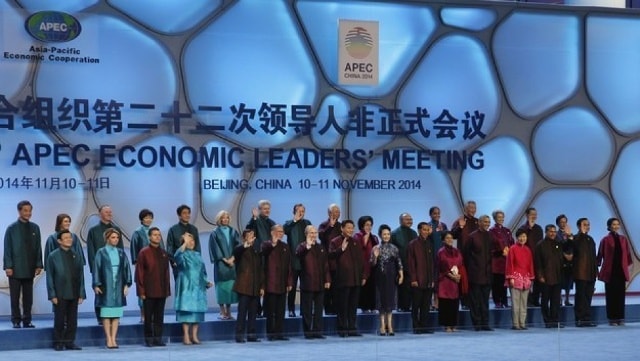 |
| The conference has special significance, marking the 25th anniversary of APEC's establishment and development (1989-2014) and 20 years of implementing the Bogor Goals on trade and investment facilitation and liberalization (1994-2014). The conference adopted 2 statements and 4 accompanying documents, notably the "APEC Connectivity Master Plan for the 2015-2025 period". This is the first time APEC has proposed measures to enhance overall connectivity with a long-term vision, especially infrastructure connectivity, to create more momentum to form a large common market and a unified space for growth and development of the entire region. |
23- The 23rd APEC Summit in Manila (Philippines), November 2015
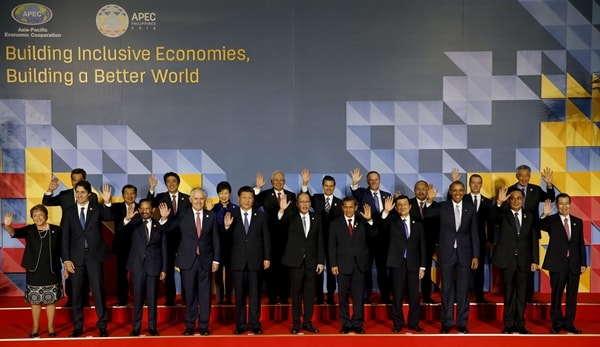 |
| The conference adopted two High-level Statements, one Ministerial Statement and six accompanying documents, with the overarching goal of sustainable and inclusive growth. This is a new step, enhancing the effectiveness of APEC Forum cooperation, expanding to new areas, linked to development goals. For the first time since the implementation of the Growth Strategy in 2010, APEC has proposed a long-term strategy emphasizing the “quality” of growth, linked to institution building, social cohesion and environmental protection. This is also the first time APEC has adopted the Services Cooperation Framework, considering it an important factor contributing to enhancing competitiveness and strengthening connectivity among Asia-Pacific economies. |
24. The 24th APEC Summit in Lima (Peru) November 2016
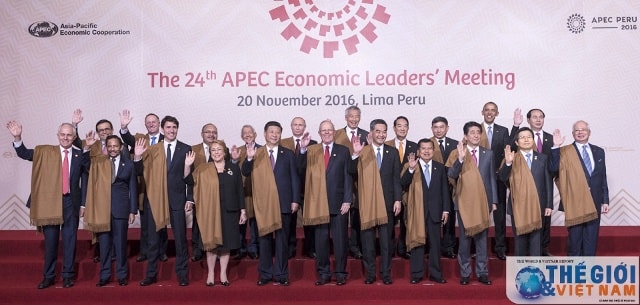 |
| The conference is themed “Quality Growth and Human Capital Development: Foundations for Sustainable Growth in Asia-Pacific”. This year’s conference will focus on three main topics: Challenges to Free Trade and Investment in the Current Global Context; Climate-Resilient Food Security and Access to Water Resources; and Asia-Pacific Connectivity: Towards Practical and Effective Regional Connectivity. |
Peace
(Synthetic)

